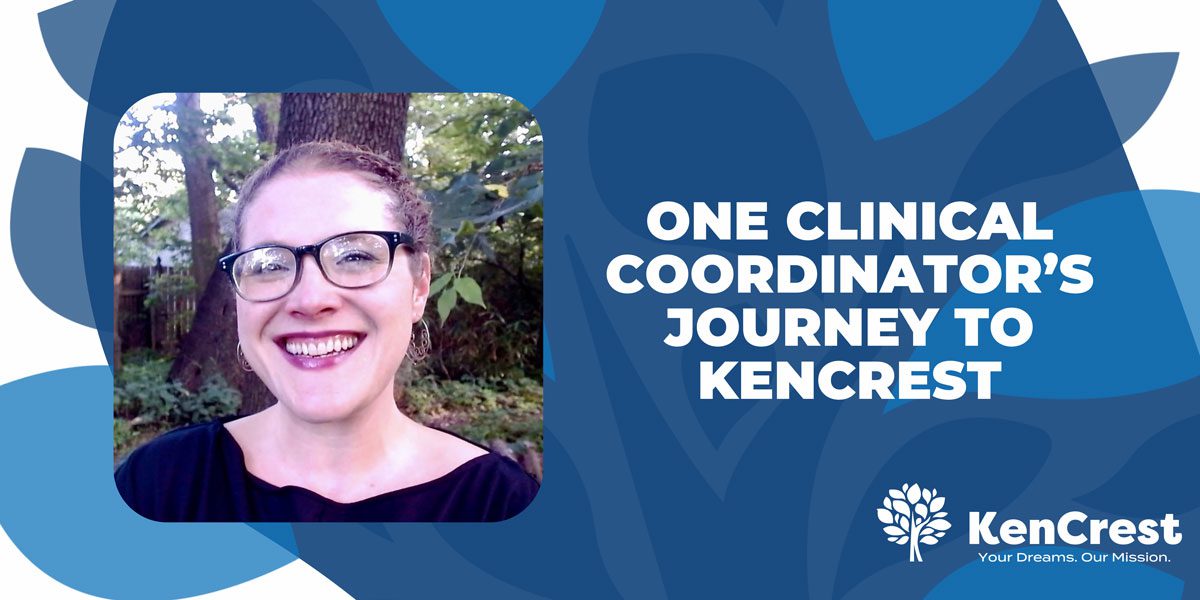
With a history in social work and psychology, Clinical Coordinator Kelly Sanders consistently helps people with IDD live fulfilling lives.
By Sydney Kerelo
For 118 years, KenCrest has advocated and supported people in need. Whether suffering from tuberculosis, caring for those with intellectual and developmental disabilities, or helping someone heal from trauma, KenCrest has always been there for people in need. And one employee, Kelly Sanders, continues that tradition.
As the daughter of Quakers and a profoundly involved social activist, Kelly Sanders joined KenCrest six years ago with the desire to help people who were in some shape or form marginalized or oppressed around their sexuality or those who experienced trauma in one form or another.
“I have dysgraphia—a neurological disorder that causes a person’s writing to be distorted—and ADHD, so my brain has always worked a little bit differently than other folks,” says Clinical Coordinator Kelly Sanders. “So, I really like working with people whose brains work in ways that don’t necessarily fit the expected typical. Or those not seen as equals and treated less than equal.”

“It’s not uncommon for anybody to experience trauma in their life, whether it be big ‘T’ trauma or little “t” trauma,” she adds. “Just trying to figure out how to navigate the world can be traumatizing; their lives don’t look like what they think they’re supposed to from movies, TV shows, or books. So, I wanted to be their translator, to help people heal and find ways to meet their needs better so they don’t always feel like they’re the ones who need to catch up.”
But it took Sanders a while to discover this. It wasn’t until she learned about a human sexuality class at Fort Lewis College that sparked her desire to work in psychology. She earned her BA in Psychology with dreams of becoming a sexologist—a healthcare practitioner who studies human sexuality, including sexual behaviors, interests, and functions. She then went on to earn a dual masters in social work and education focusing on human sexuality from Widener University.
While transitioning to Widener University, Sanders worked at Bancroft as a Direct Support Professional and a Clinical Case Manager in their residential program. She also interned at Widener’s Clinical Services for Vulnerable Adults program as a Clinical Social Work intern working with adults who were vulnerable because of their mental health, being financially disenfranchised, or those with an intellectual disability.
Once she began working with people with disabilities, she knew that was the career for her, and she found a consultant position at KenCrest that was perfect for her. Now, six years later, she’s at KenCrest full-time and constantly helping the people she supports.
“I’m currently transitioning from Behavior and Sexuality Specialist to a Clinical Coordinator,” says Sanders. “As the Behavior and Sexuality Specialist, I got to work with individuals and their teams around concerns for safety, like finding ways for people who have experienced trauma to move forward with their lives in the way they want. I got to help them develop skills and understand how to navigate getting what they want from their lives. But in the new position, I’ll be helping the department by reviewing plans and notes from other therapists, helping to bring in new staff and training them, and introducing new skill systems.”
RELATED: What is Sexuality Counseling?
The Skills System, Dialectical Behavior Therapy (DBT) informed approach is just one of many therapeutic tools Sanders introduced to KenCrest. Initially designed for those with borderline personality disorder, the skills system helps individuals who struggle to manage their emotions, interact with others, and problem-solve independently, among other things.
“The great thing about the program is that it’s not only designed to be accessible to the individuals but it’s designed to be able to help make anybody around them potentially be a coach to help them through learning and using these skills,” says Sanders. “There is no downside to giving staff basic mental health first aid.”
Throughout her six years at KenCrest, Sanders helped numerous people with disabilities find happiness and peace. One of her first clients lived in residential care with another organization and had severe problematic behavior—verbal aggression, physical aggression, false accusations, and more. He was immensely unhappy in residential care but eventually got his own apartment, which changed his life.
One day, Sanders visited his apartment, where she played the card game War for hours with him and sang along to all his favorite songs. “He was just at a place in his life where he was not miserable all the time, where he saw points of happiness,” says Sanders.
Seeing firsthand how a straightforward change in someone’s lifestyle can alter their lives motivates Sanders and encourages her to continue helping as many people with disabilities live fulfilling lives as possible.
Want to learn more about how KenCrest’s Behavioral Health Supports and Services Department helps people with disabilities? Click the link below!
